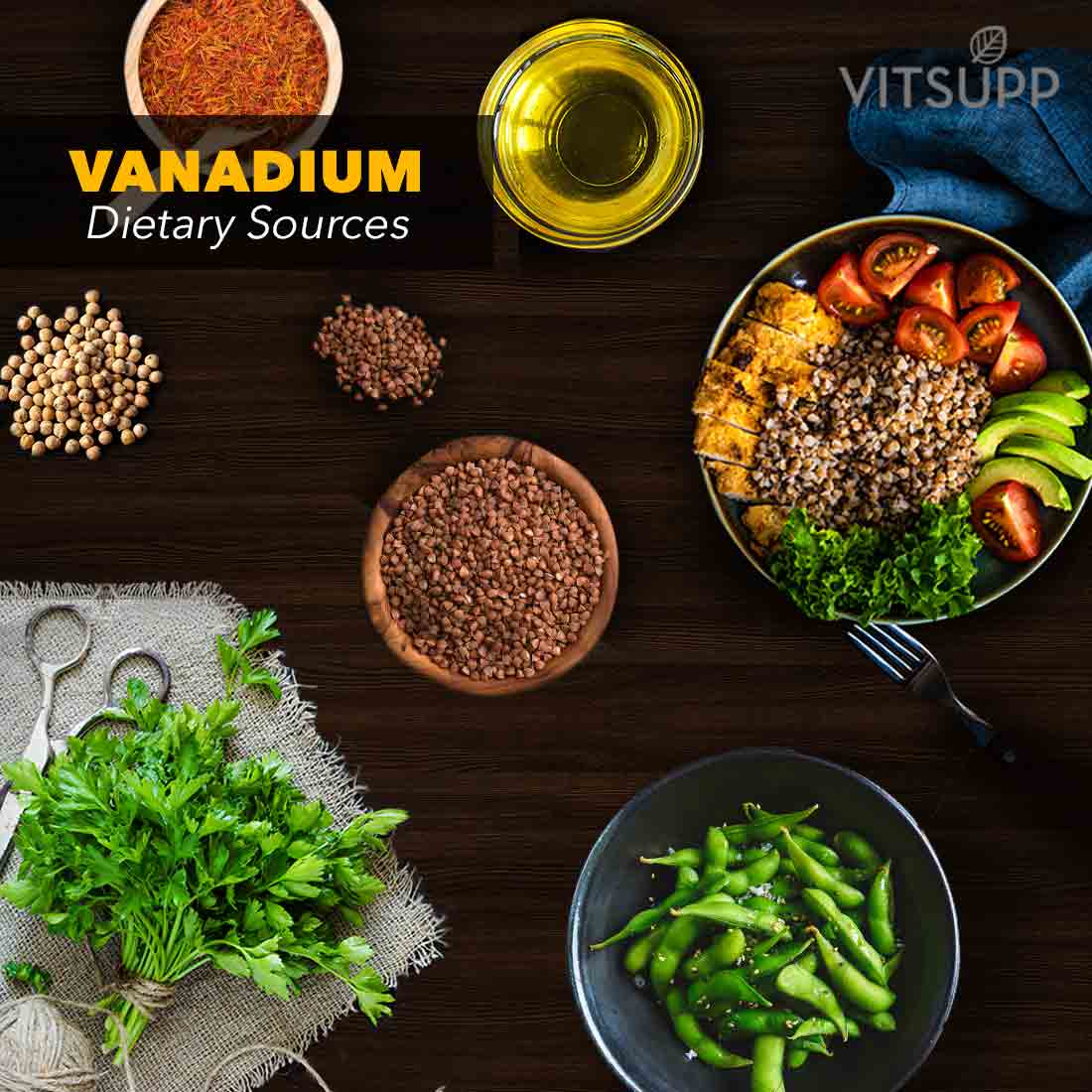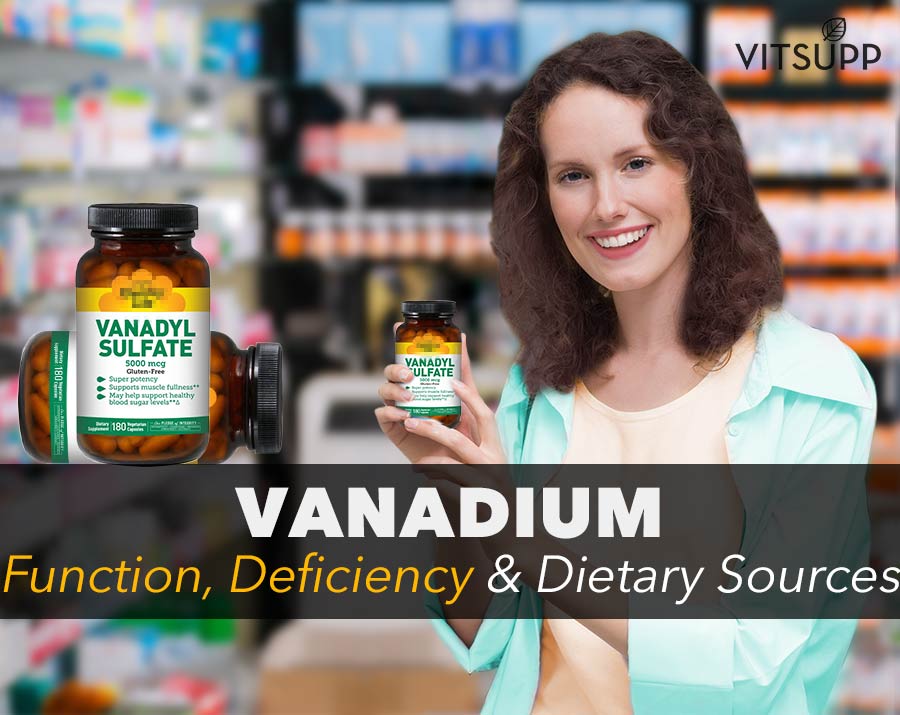Have you heard of vanadium? If you have, then you are a part of a very few groups of people who are aware of this mineral. Do you know how important it is? Keep reading to know all about this mineral.
In most cases, you are probably already consuming vanadium. This is if you have included foods like spinach, shellfish, mushrooms, black pepper, dill seeds, and vegetable oils in your diet.
If yes, then that’s great! If you don’t, then you might have to start considering the addition of these foods as a part of your dietary intake. In this article, we tell you everything you need to know about vanadium…
Contents
What is Vanadium
Vanadium is a mineral nutrient and is acquired from dietary sources. As it is readily excreted in the urine, it is an essential mineral for your body.
Through dietary sources, approximately 5 to 10 mcg/d of dietary vanadium (V) is absorbed in the small intestine and is found in kidneys — bone, liver, spleen and bone.
Neither RDA nor Al (adequate intake) has been established for vanadium because little is known about its role in human biochemistry.
Vanadium uses in the human body
One of the most well-known vanadium uses in the body is for the treatment of diabetes and prediabetes. Vanadium is used commonly to address low levels of sugar in the blood, a condition known as hypoglycemia. It is believed that vanadium works a lot like insulin. It can also increase the effect that insulin has on the body.
Additionally, it can help lower high levels of cholesterol in the blood as well. Cholesterol is good for the body when in adequate amounts. Cholesterol plays a significant role in some of the critical processes of the body, like building the structure of cell membranes and helping with the production of certain hormones.
However, excess cholesterol in the body, a condition known as hyperlipidemia, can cause a lot of health risks like heart ailments and strokes. Consuming vanadium is believed to help with the regulation of cholesterol levels in the body. (1)
Vanadium benefits for the human body
1 Diabetes
As we’ve mentioned above, vanadium is a mineral compound that is most commonly found in plants and animals, in small quantities. It has been used for the treatment of diabetes patients for years and has proven to be quite useful. Vanadium can treat diabetes by working just like insulin. It can help normalise the levels of blood sugar in people, so if you have below-average levels of blood sugar or excess blood sugar in your body, it is advisable to consume vanadium dietary supplements.
Research suggests that vanadium can help regulate blood sugar levels in animals who suffer from both type 1 diabetes as well as type 2 diabetes. Studies show that people with diabetes will benefit from vanadium. It has been beneficial for glycaemic control in Type 1 and types 2 diabetes. An increase in insulin sensitivity was observed in those who had consumed vanadium. Additionally, it was found that their need for insulin was lowered as well, and insulin resistance was managed.
However, more research will have to be conducted to prove the link between vanadium and diabetes strongly. (2)
2 Prediabetes
There is no concrete evidence that supports the fact that vanadium can affect prediabetes. However, based on anecdotal evidence, it is believed that vanadium can be beneficial in the prevention of diabetes. (3)
3 Tuberculosis
According to a few anecdotal evidence, it is believed that vanadium can help with tuberculosis. Tuberculosis is a medical condition that involves a bacterial infection that mostly affects the lungs. It can be potentially life-threatening, if not treated on time. More scientific evidence will be required to support the effect of vanadium in treating tuberculosis strongly. (4)
4 Hyperlipidemia
Hyperlipidemia is a condition in which the body has higher than normal levels of cholesterol. Animal studies have indicated that the consumption of vanadium could prove to be effective in lowering the levels of total blood cholesterol and triglyceride levels. However, to effectively prove the association between vanadium and blood cholesterol levels, more studies will have to be conducted. (5)
5 Heart disease
As we’ve mentioned above, vanadium is beneficial in lowering the levels of blood cholesterol in the body. Excess levels of blood cholesterol can have a negative impact on the health of your heart, causing you to suffer from heart ailments. There is anecdotal evidence to support the fact that vanadium is good for heart health, blood pressure, and to keep heart ailments at bay. (6)
6 Anaemia
Anaemia is a medical condition in which the blood in your body lacks an adequate amount of healthy red blood cells. According to anecdotal evidence, it is believed that vanadium can help with anaemia. However, more research and scientific evidence are required to support this. (7)
7 Prevention of cancer
Certain studies claim that vanadium has anticarcinogenic properties. A study conducted on mice concluded that the growth of mammary tumours was inhibited after the consumption of vanadium. However, more human studies will be required to support this. (8)
8 Edema
Edema is a medical condition that is characterised by swelling. This is caused due to excess fluids that are trapped in the body’s tissues. According to anecdotal evidence, it is believed that vanadium can help relieve swelling associated with edema. However, more studies and research will be required to support this. (8)
9 Enhance athletic performance
There are a few claims that suggest vanadium for enhancing athletic performance. However, this is purely based on anecdotal evidence. More scientific knowledge and studies will be required to support this. (9)
Vanadium in Food (Dietary Source of Vanadium)

Most of us have probably not heard of vanadium. However, the chances are that knowingly or unknowingly, we have been consuming foods with chromium and vanadium as it is found in small quantities in a few food sources. The chromium and vanadium rich foods are:
1 Black pepper
If you’re someone who can’t resist that dash of pepper in your soup, then there’s good news – apart from being of great medicinal value, black pepper also contains a good amount of vanadium. Black pepper contains close to 987 NH/g.10 of vanadium. So go ahead and season your food with some black pepper, to keep diabetes and high cholesterol levels at bay.
2 Dill Seeds
This seed is most commonly used in stews and soups. It has a distinct taste that adds a special flavour to certain dishes. There is a good amount of vanadium present in dill seeds. It contains close to 431 Ng/g of vanadium.
3 Shellfish
Shellfish such as lobsters and oysters are a good source of vanadium. When consumed fresh, you will be ingesting close to 100 ng/g of vanadium. This slightly increases to over 400 Ng/g if the shellfish is dry or in its concentrated forms. These happen to be one of the few animal-based sources of vanadium.
4 Spinach
Unfortunately, not many vegetables have high doses of vanadium. However, spinach surely does. The amount of vanadium present in spinach is especially high when it is freeze-dried, reaching close to 533 to 840 Ng/g of vanadium. Spinach makes quite the recurrent rounds in most Indian cuisine as well as Thai or Asian cuisines. Don’t hesitate to grab a bunch of spinach leaves the next time you’re out for grocery shopping!
5 Cereals and whole grains
There is no denying that cereals and whole grains are an important addition to your diet. From vitamins, fibers, protein, and carbohydrates, they give it all. These foods are also a good source of vanadium. You’ll get close to 5 to 30 Ng/g of vanadium with the consumption of cereals and whole grains.
6 Mushrooms
If you’re a vegetarian and you want a plant-based source of vanadium, then you could probably opt for mushrooms. They are a good source of vanadium. You can add mushrooms as a part of your diet as they are tasty and rich in nutritional value. It contains close to 50- 2,000 Ng/g of vanadium, which is quite a bit.
7 Dairy products
Most dairy products are a good source of vanadium. You’ll get this mineral from consuming cheese and butter, but the highest source of vanadium among dairy products is milk. You get close to 5 – 30 Ng/g of vanadium from dairy products.
8 Vegetable oils
Certain vegetable oils like olive oil, peanut oil, soybean oil, and corn oil, are a good source of vanadium. Opt for a diet that is rich in unsaturated fats as this is a healthier option. Make sure you add some of these oils to your diet to increase your chances of consuming vanadium.
Go ahead and add foods high in chromium and vanadium in your diet today.
Physiological Function of Mineral Nutrient Vanadium
Studies in humans suggest that vanadium has a role in glucose and lipid metabolism, red blood cell formation and thyroid function. As mentioned above, vanadium can manage the levels of insulin and increase insulin sensitivity in humans. It can also work just like how insulin does, to regulate blood sugar levels in the body.
Research suggests that vanadium can regulate lipid metabolism, glucose metabolism and manage cholesterol levels in the body as well. It is beneficial for those who are suffering from high levels of cholesterol. (10)
Causes of Vanadium Deficiency
Vanadium deficiency has not been established in humans, but the most likely cause of Vanadium deficiency is the low intake of Vanadium rich food products or mal-absorption in GI.
There are a few foods that are rich in vanadium. This includes both plants-based as well as animal-based foods, such as spinach, black pepper, vegetable oils, shellfish, and mushrooms. Black pepper and dill seeds are known to have the highest amounts of vanadium. (11) Eat foods rich in this nutrient to avoid chromium and vanadium deficiency symptoms.
Health concerns due to Vanadium deficiency
In animals, Vanadium deficiency can lead to increased abortion, diminished lactation, weak growth. Thyroid changes and changes in hepatic lipid profiles. Vanadium deficiency could lead to Insulin insensitivity, abnormal blood lipids.
Additionally, it has been observed that vanadium could lead to the following health complications –
- The slow rate of growth or diminished development
- Increase in the rate of infant mortality
- Elevated levels of cholesterol in the blood
- High levels of triglycerides in the body
- Diabetes, both type 1 diabetes and type 2 diabetes
- Obesity or being overweight
- Cardiovascular diseases and ailments
- Infertility or problems with reproduction
- Hypoglycemia
- Hyperinsulinemia
However, it is worth noting that there is no sufficient evidence to determine the effects of vanadium deficiency in humans strongly. More studies and research is required to support this. (12)
Assessment of Vanadium Mineral Status
RBC, Whole Blood, Urine.
Supplementation of Vanadium mineral Nutrient
Adult Dosage (Males-Female) 9mcg yo 125 mg. Vanadium supplementation ranges from 9mcg in multivitamin formulas to 125 mg/d as vanadyl sulfate in diabetic patients.
Best or most Bio-Available or Active form of Vanadium Health Supplement
Optimal forms of vanadium include sodium metavanadate and vanadyl sulfate.
Vanadium side effects
Vanadium is generally considered safe for consumption. This, however, is if your consumption is limited to around 1.8 mg every day. Consuming too much vanadium can lead to side effects like nausea, diarrhoea, bloating, gas, and general discomfort in the stomach. In severe cases, it can also lead to loss of energy, kidney damage, and issues with the nervous system. It can also cause a greenish tongue. (13)
Warnings and precautions
Vanadium is generally considered safe. However, there are a few warnings and precautions that you need to keep in mind. These are listed below –
Vanadium and pregnancy
Vanadium is considered safe during pregnancy. However, it must be consumed in small amounts and through food sources. It is best to stick to the amount of 1.8 mg per day, as large amounts of vanadium can be possibly unsafe when you are pregnant. There have been accounts of the amniotic sac breaking, in cases where there is a higher quantity of vanadium present in the urine. (14)
Vanadium and breast-feeding
This mineral is considered safe during breast-feeding if consumed from food sources. However, if you are breast-feeding, it is best to avoid taking vanadium supplements. There is insufficient information regarding this, so it is best suggested to avoid the intake of vanadium without the consultation of a healthcare professional. (15)
Vanadium and children
For children, vanadium is considered safe, however only in food amounts. Refrain from giving your children vanadium supplements as it can cause unnecessary side effects. Consult your doctor if you still want to give your child vanadium supplements. (16)
In conclusion
Not many people know about vanadium. It is an important mineral that is found in a few animals and plants. Consuming vanadium on the regular has shown to help with the regulation of blood sugar levels in the body, as well as the lowering of cholesterol levels in the blood. Some anecdotal evidence suggests that vanadium can help treat anaemia, edema, tuberculosis, and heart ailments.
However, scientific knowledge and research regarding vanadium are limited. More human studies will have to be conducted to determine the exact effect that vanadium can have on the human body. Consuming vanadium rich foods like black pepper, dill seeds, shellfish, vegetable oils, spinach, and mushrooms, can help treat any vanadium deficiency that you might have.


